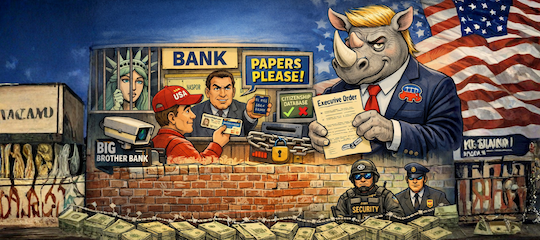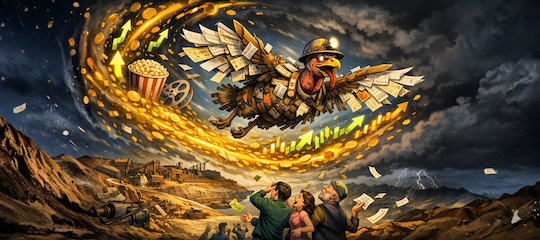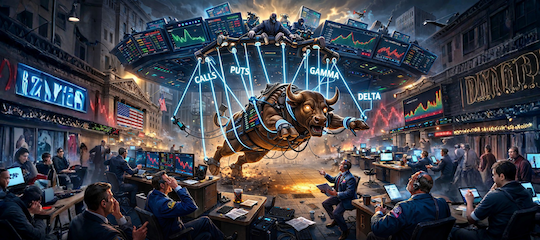
Posted October 12, 2023
By Sean Ring
What is the Cantillon Effect?
- Richard Cantillon was an Irish-French economist who realized money creation distorted the economy.
- Here’s further reasoning as to why I love Palantir (PLTR) going forward.
- Who gets the freshly printed money first gets to profit and spend, raising prices for everyone else.
When I explained why I love Palantir stock (PLTR), I didn’t give enough reasoning. Let’s do that today. The same arguments I used to show why banks do well applies to PLTR. Except, and this is the best part, the money goes straight from the government to PLTR.
We need to talk about Richard Cantillon, the great Irish-French economist.
Cantillon was an Irish-French economist and author of Essay on the Nature of Trade in General, a book William Stanley Jevons considered the "cradle of political economy.”
That book influenced reams of classical economists like Adam Smith. And his theories hold water to this day.
Note: I borrow heavily from a Rude I wrote on October 21, 2021.
Cantillon effects are worth re-examining.
But first, let’s define the term.
The Cantillon Effect is the concept of relative inflation or a disproportionate price rise among different goods in an economy.
Richard Mayberry, the author of the Uncle Eric books, redefined this as “cones.”
Mayberry laid out the concept first in The Clipper Ship Strategy, one of his Uncle Eric books.
I can't recommend these books enough if you haven’t read them. All eleven are available from his publisher here, much cheaper than you can get them on Amazon.
But before we get to Mayberry and his cones, let’s visit an old friend first.
Rothbard Eloquently Explains the Process
It's not a mystery why the banks are so profitable. Whether you've read Cantillon, Mises, Rothbard, Hayek, or more contemporary writers like Richard Mayberry, they've all pointed to one thing.
When a central bank prints money, the first people who get said printed money are the commercial banks. Both central banks and the government then lavish spending on their pet projects.
Of course, Wall Street is the Fed’s one and only. The monetary largesse goes there first before The Street places its bets.
In his magnum opus Man, Economy, and State, Murray Rothbard lays out exactly how banks benefit at the expense of the rest of us:
Credit expansion has, of course, the same effect as any sort of inflation: prices tend to rise as the money supply increases. Like any inflation, it is a process of redistribution, whereby the inflators, and the part of the economy selling to them, gain at the expense of those who come last in line in the spending process. This is the charm of inflation—for the beneficiaries—and the reason why it has been so popular, particularly since modern banking processes have camouflaged its significance for those losers who are far removed from banking operations. The gains to the inflators are visible and dramatic; the losses to others hidden and unseen, but just as effective for all that. Just as half the economy are taxpayers and half tax-consumers, so half the economy are inflation-payers and the rest inflation-consumers.
Uncle Eric Explains All
Richard Mayberry concentrates more on the fiscal side, but the results are the same.
Mayberry notes that analysts and economists wrongly assume that the new money printed and the fiscal deficit spending are evenly distributed throughout the land.
Nothing could be further from the truth.
Instead, money is injected into specific locations, which he calls “cones.”
Mayberry writes, "The best way to invest is to look where the government is putting money and invest there."
To use his euphemism, they essentially “pour” the money into a city, a geographical area, or an industry.
Because of the government largesse - just redistributed taxpayer funds - the stocks representing the companies receiving the subsidies, tax breaks, or straight investment will go up.
That was his entire theory in a nutshell, and it's exquisite.
The biggest cone in the world is lower Manhattan.
That's the most oversized cone in the world because they get the new, freshly printed money.
Bankers have driven up this bubble because they get paid first.
Of course, it’s not just the bankers but asset managers, non-bank financial institutions, and private equity funds.
After distributing their profits, they go out and spend their money and drive prices up first.
By the time the money trickles down to the populace, they can't buy nearly as much with it because the bankers have driven the prices up.
This is why there is such an enormous disconnect between what's going on on Wall Street and Main Street.
Main Street doesn't get the money fast enough.
Now, Main Street can't buy a house because of it, and it's a damn shame.
A genuinely free market would have gently rising and falling asset prices, and you could time the market better.
It wouldn't be perfect, and sometimes you'd have to buy it when prices are high.
How Do Banks Make All That Money?
There are a few ways that banks make money.
One is net interest income.
If rates are indeed going to rise because of inflation, banks should make more money based on the difference between the amount that they pay you in deposits and the amount they charge to lend to you.
But because our big banks are also investment banks and sales and trading houses, they get to make money in many other ways.
Bankers who are working in equity origination charge advisory fees. That's IPOs, mergers and acquisitions, and leveraged buyouts. They're making a ton of money, as are their lawyers and accountants.
Sales and trading will also make a ton of money because the market's just going up, and they have a bullish natural ax.
I explained these natural axes in an earlier Rude, but let me remind you what's happening here.
The Axes Grind
The biggest clients of Wall Street are the portfolio managers like BlackRock, Fidelity, and Vanguard.
Pension funds, insurance companies, and endowment funds that use portfolio managers to execute their strategies always hold stock.
There are two ways that they will hedge this stock.
One way is to buy puts against the stock, which is slightly more expensive but completely protects the stock’s downside.
They'll buy the puts from the banks, which means the banks are naturally long the market. If you're short a put, it’s a bullish play.
They may also sell calls against stocks that they don't think will fall too much, but they also don't think are going to roof it.
Naturally, when they sell those calls to the banks, the banks are long calls.
When you combine a long call position and a short put position, you have a bullish synthetic long stock position.
So, as long as the stock market keeps going up, the banks will make loads of money just from the inventory of options positions and the stocks they hold to lend to other financial institutions and hedge funds.
Let me leave you with Uncle Eric’s excellent advice:
- Find out where there is a cone.
- Tap into that cone.
- Don’t expect the cone to last forever.
- Always be searching for new cones.
Thanks to America’s penchant for spying, PLTR’s cone is just getting started.
Have a great day!

The Biggest RINO of Them All
Posted February 27, 2026
By Sean Ring

Sports, Predictions, and Morons
Posted February 26, 2026
By Sean Ring

SOTU or STFU?
Posted February 25, 2026
By Sean Ring

Building an AI-Proof Portfolio
Posted February 24, 2026
By Sean Ring

Beware of Flying Turkeys
Posted February 23, 2026
By Matt Badiali

